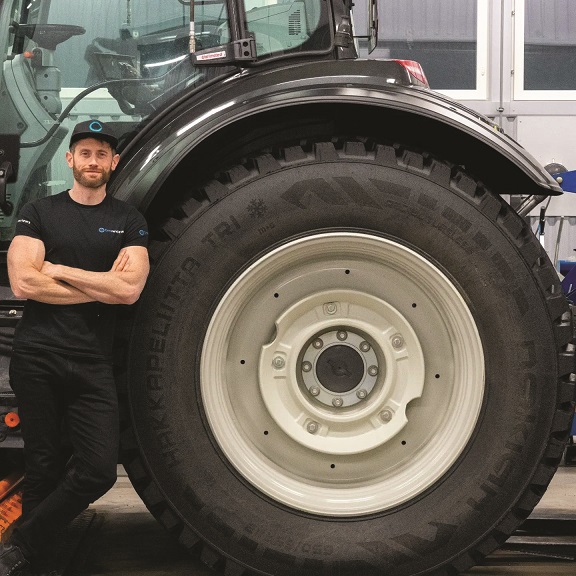Master Class On Tyre Reviews With Jonathan Benson
- By Sharad Matade & Drumil Modi
- December 27, 2024

Tyres, an essential yet often overlooked vehicle component, play a pivotal role in performance and safety. Since 2006, Jonathan Benson’s Tyre Reviews has been a trusted resource, offering independent, data-driven insights. Through his YouTube channel, with over 60 million views, and his website, Benson empowers consumers across Europe and the US to make informed tyre choices.
Tyres are as important as any other component in a vehicle, maybe even more. However, while selecting tyres, we seldom look towards deeper insights to derive which fits our needs best. Reviewing tyres before purchase is crucial for obtaining metrics that help derive optimum performance for any vehicle.
Jonathan Benson-led Tyre Reviews has been working since 2006 to help select tyres better. The automotive enthusiast offers actionable insights into the rubber wear through his YouTube Channel, which has over 60 million views, and his website, covering the European and US markets.
A tete-a-tete with the independent reviewer by Tyre Trends explored his aspirations and methodology. Speaking to us, he said, “It all started with a love for karting and automotive engineering. I was racing a bit when I was younger, but as I grew older and outgrew karting, I transitioned to track days with my first car, a hot hatchback fitted with the original Michelin Pilot Sport tyres. The pivotal moment came early in the 2000s during a routine tyre replacement. After burning through the front tyres at track days, a visit to the garage led to a new set of tyres different from the originals, but still Michelin. I turned the first corner and immediately noticed the difference. The disparity sparked a question as to why do tyres perform so differently, even within the same brand?”
“It became clear that there was a gap in accessible, reliable tyre information. I decided I could fill it, and what began as a user-generated review site gradually grew, leveraging a blend of aggregated reviews and professional insights. Over the years, it transformed into a trusted authority, testing and reviewing tyres not just for personal consumption but for a global audience,” he added.
Benson emphasised that tyres are not just rubber circles but a complex piece of engineering that influences vehicle handling, braking, comfort and overall performance. “A good tyre is a good tyre,” he asserts. “If you have a bad tyre on a BMW or a bad tyre on a Volvo, it’s still about the tyre.” With this statement, he shows how critical it is for drivers to understand their tyre's characteristics and performance capabilities.
Reviewer’s tale
The journey into tyre testing, spanning nearly two decades, was described as enlightening, challenging and painstakingly slow. “It’s a niche within a vast industry, where immense volumes and revenues are influenced by a surprisingly small group of decision-makers. In the UK, particularly among premium manufacturers, the tyre sector is tightly knit with relatively few employees wielding significant sway over major markets,” averred Benson.
Reflecting on his early days, he noted that the path to collaboration with manufacturers was far from straightforward. Gaining trust from industry giants as an independent tester, equipped with little more than a website or a modest YouTube channel, required persistence. It was a grind marked by countless late nights and considerable risk including leaving a stable, well-paying job to pursue tyre testing full-time.
Success, as with many industries, did not come overnight. The groundwork laid by established outlets like Auto Bild and Auto Express in independent tyre testing provided a foundation.
He stated that the testing process itself is intricate, often dependent on manufacturers' co-operation. Conducting credible tests required access to proving grounds, facilities typically owned by tyre companies. Securing this access meant navigating a delicate balance – approaching manufacturers at the right time, often when a promising new product is on the horizon.
As for acquiring the tyres, methods vary. Sometimes they are purchased independently to ensure impartiality; other times, manufacturers submit specific patterns for evaluation. Following each test, a verification process is critical, which includes selecting random samples, including top-performing models, and comparing them against market-available versions to maintain transparency and credibility.
With approximately 40 to 50 tests conducted so far, Benson’s work underscores the meticulous, behind-the-scenes effort required to inform an industry and its consumers. Each test, from summer to winter tyres, represents a small step in demystifying an often-overlooked yet essential component of modern vehicles.
Testing the tyres
For a seasoned tyre tester like Benson, preparation has evolved into a minimalist approach. Initially marked by nerves and stress, the process has now become second nature.
The philosophy behind this approach stems from a commitment to impartiality. While the logistics of a test, such as the type and scope, are meticulously planned, Benson prefers not to know which specific tyres are being evaluated. "I don’t even want to see what’s being mounted. If I know a Michelin is going on, it could subconsciously influence my driving, no matter how neutral I try to remain,” he said.

Instead, tyres are assigned anonymised set numbers, ensuring that assessments of handling, comfort, noise and wet or dry performance are recorded without bias. The results are entirely based on what the he feels behind the wheel, unclouded by brand perceptions.
However, maintaining impartiality isn’t always straightforward. In some scenarios, such as when conducting tests on a local track and personally changing tyres, complete anonymity isn’t possible. In these cases, professionalism and experience come into play.
Brand inclusion in tests presents another challenge. While blind testing ensures unbiased results, the decision to include major players like Michelin, Continental and Goodyear is driven by audience interest. "If I tested six unknown brands, it wouldn’t resonate with viewers. People want to know how a new tyre stacks up against industry benchmarks like Michelin,” he noted.
He also explained that the nature of tyre testing changes across regions. In Europe, strict environmental regulations prioritise rolling resistance and sustainability. In contrast, the US market focuses heavily on tread life. “The procedures might be similar, but the demands of each market make the tyres themselves entirely different,” said Benson.

Global outlook
Jonathan noted that there is an increasing interest from Asian manufacturers eager to showcase their advancements. “Companies like Triangle and Linglong are striving to improve quality and gain recognition," he said. However, the influx of low-quality, unregulated tyres from other manufacturers remains a challenge in the global market.
Furthermore, sustainability targets in Europe, particularly regarding rolling resistance and particulate matter, are putting pressure on top manufacturers. “It's tough to improve grip while meeting environmental goals," Benson observed. Despite promising innovations like Continental's dandelion rubber, he feels significant breakthroughs are still elusive.
Non-pneumatic tyres, a much-discussed concept, remain in developmental limbo. “They’re getting close, but they need a major technological leap before mass adoption,” he said, highlighting the delays from manufacturers in launching new products due to stringent performance targets.
Commenting on the demand for tyre reviews in markets such as India, he noted that he was not familiar with many tyre patterns used in such markets. Nonetheless, he remained optimistic about the global industry's ability to innovate under pressure. "The next few years will be fascinating to watch as manufacturers strive to balance performance, sustainability and regulatory challenges,” he said.
Road ahead
As the tyre industry embraces virtualisation and simulation, traditional roles are fading and independent testers like Benson face an uncertain future. "Manufacturers are increasingly relying on simulation in the early development stages, and this shift is reducing the demand for physical testing and leaving reviewers without renewals when roles become redundant,” he explained.
“I don’t think what I’m doing will exist in 50 years. The decline in driving and shifting consumer priorities towards convenience and autonomy in vehicles have already reshaped how people engage with automotive content,” he added.
He has also begun offering private testing services to manufacturers during development cycles, striking a balance between commercial collaboration and independent content creation.

Now based in the US, Benson finds himself navigating a different market dynamic. “In Europe, independent tyre testing has a long tradition. The US market doesn’t have the same culture,” he observed, noting the added challenge of building trust and credibility with American manufacturers.
For aspiring reviewers, he shared a realistic perspective, stating, “Starting now is tough. An engineering background and proximity to a proving ground are essential.”
Sangwoo Ryu Named CEO Of Kraton Corporation
- By TT News
- February 07, 2026

Kraton Corporation, a leading global producer of speciality polymers and high-value bio-based chemicals derived from pine wood pulping co-products, has named Sangwoo Ryu as its new Chief Executive Officer. Ryu possesses over 25 years of leadership in finance and operations within international markets. He is currently the CEO of Cariflex Pte Ltd, a former Kraton spin-off now under DL Chemical, where he initially served as Chief Financial Officer starting in February 2020. He assumed the Cariflex CEO role in April 2025 following the promotion of its former CEO, Prakash Kolluri, to President of Kraton's Polymer business.
Ryu’s deep expertise in financial strategy, investment controls and operational planning is expected to strengthen Kraton’s standing as a reliable leader in global Pine Chemical and Polymers markets. In his new position, he will collaborate with Kraton’s Executive Leadership, Board of Directors and Cariflex Leadership to guide strategic decisions and operational excellence, reinforcing the company’s commitment to sustained growth and organisational stability.
Ryu said, “I want to express my gratitude towards the members of the Board of Directors and the Kraton Leadership Team for their unwavering dedication to Kraton’s success. I’m looking forward to leading Kraton into the next era of excellence, building upon the strong foundations and principles set forth in our vision and values.”
Industry Veteran Dieter Jerschl To Represent FORNNAX In Central Europe
- By TT News
- February 07, 2026

As part of its strategic growth into Central Europe, FORNNAX TECHNOLOGY, a global leader in recycling equipment manufacturing, has established a new sales partnership in Germany. The company has appointed industry veteran Dieter Jerschl as its representative for the region to drive the promotion and implementation of its recycling systems. Jerschl’s extensive expertise, built over two decades with prominent firms like BHS, Eldan and Vecoplan, encompasses a deep understanding of diverse waste streams such as tyre, cable, municipal solid waste and e-waste.
This collaboration, initially targeting Germany, Austria and adjacent countries, is designed to be flexible and scalable. Its primary aim is to cultivate a strong project pipeline and solidify FORNNAX’s regional footprint. The partnership extends beyond sales to include comprehensive technical support, with Jerschl’s team providing vital value-added services like installation, maintenance and spare parts assistance. This local service framework is intended to ensure efficient project execution, minimise operational downtime and elevate customer satisfaction.
By leveraging Jerschl’s profound market insight and established networks, FORNNAX seeks to accelerate the adoption of its high-performance shredding and pre-processing technologies. The move underscores the company’s global strategy of embedding local expertise within key markets, which it deems crucial for developing technically sound solutions tailored to specific regional waste challenges. This initiative reinforces FORNNAX’s dedication to innovation and environmental stewardship, advancing its mission to deliver sustainable recycling solutions worldwide.
Jerschl said, “I’ve known FORNNAX for over a decade and have followed their growth closely. What attracted me to this collaboration is their state-of-the-art technology; it is powerful, sustainable, and economically viable. There is great potential to introduce FORNNAX’s innovative systems to more markets across Europe, and I am excited to be part of that journey. We are committed to increasing market awareness and establishing new reference projects across the region. My goal is not only to generate business but to lay the foundation for long-term growth. Ideally, we aim to establish a dedicated FORNNAX legal entity or operational site in Germany over the next five to 10 years.”
Jignesh Kundaria, Director and CEO, FORNNAX, said, “We see tremendous potential in the Central European market. Partnering with someone as experienced and well established as Jerschl gives us a strong foothold and allows us to better serve our customers. This marks a major milestone in our efforts to promote reliable, efficient and future-ready recycling solutions globally.”
- KraussMaffei Extrusion
- Fernley H. Banbury Award
- Rubber Division of the American Chemical Society
- Sustainable Rubber Processing
- Global Polymer Summit
KraussMaffei’s Dr Gerard Nijman Earns Prestigious Fernley H. Banbury Award For 2026
- By TT News
- February 06, 2026

Dr Gerard Nijman of KraussMaffei Extrusion has been selected as the 2026 recipient of the prestigious Fernley H. Banbury Award, one of the rubber industry’s highest international honours, presented by the Rubber Division of the American Chemical Society (ACS). This award annually recognises outstanding scientific and technological contributions to the field.
The award commemorates the inventor of the internal mixer and highlights sustainable innovations in production technology, instrumentation, process control and the development of processing methods for rubber and similar materials. Dr Nijman’s career exemplifies such innovation, having significantly advanced rubber rheology, pioneered new mixing and multiplex extrusion technologies and modernised the production of silica compounds for the tyre industry.
His work has effectively bridged the gap between scientific research and industrial application. Notably, in the 1990s at Vredestein, he introduced novel mixing technologies and multiplex extrusion to tyre manufacturing. He also contributed to pioneering processes for silica compound processing, foundational to technologies like Michelin’s ‘Green Tyre’. Furthermore, his rheology-based designs for extruder screws and flow channels have helped shape enduring industrial standards.
Dr Nijman, who joined KraussMaffei Extrusion in 2017, brings decades of expertise from previous roles at Apollo Tyres Ltd and Vredestein Banden BV. His ongoing collaborations with the German Institute for Rubber Technology (DIK) and the University of Twente have also profoundly influenced his approach. KraussMaffei Extrusion itself is globally recognised for its tyre technology, building on longstanding Berstorff expertise to deliver advanced extrusion solutions for treads, sidewalls, innerliners and other components, as well as high-performance multiplex and calender systems.
The award acknowledges not only his specific technical achievements but also his distinguished career and lasting impact on rubber processing. The official presentation will be held in September 2026 during the Global Polymer Summit in Louisville, Kentucky, US.
Dr Nijman said, “It is a great honour for me to receive the Fernley H. Banbury Award. This recognition confirms the importance of the close connection between research and industrial practice in rubber processing and motivates me to continue to drive forward innovative solutions for our industry.”
Ralf Benack, Managing Director, KraussMaffei Extrusion, said, "We warmly congratulate Dr Nijman on this outstanding award. With his in-depth knowledge, many years of experience and tireless dedication, he has had a decisive influence on the rubber and tyre industry and has further developed our technologies in a targeted manner. This recognition is more than deserved. We are very proud to have Dr Nijman in our team!"
Michelin Appoints James Dimmock As Commercial Communications Manager For UK And Ireland
- By TT News
- February 05, 2026

Michelin has appointed James Dimmock as its new Commercial Communications Manager for the United Kingdom and the Republic of Ireland. Based at the company's Stoke-on-Trent headquarters, he will report to the Northern European Communications team. In this capacity, Dimmock will oversee all commercial communications, including public relations, social media and influencer partnerships.
His mandate involves crafting the brand's commercial narrative, fostering stronger connections with media and content creators and producing innovative digital content to support the brand's growth. He brings more than two decades of extensive experience with Michelin to the role, having held various senior marketing and communications positions both internationally and domestically. His most recent role was as Social Media and Influencer Manager. He will now lead these efforts locally while integrating with the broader communications team.
John Howe, Managing Director, Michelin UK, said, “James has already made a significant contribution to Michelin communications activity in the UK & ROI. His deep understanding of our business and products, combined with his strategic and creative approach, makes him ideally placed to lead our commercial communications as we continue to evolve our brand.”
Dimmock said, “I am excited to be taking on this new role at Michelin. It is a privilege to continue building on the work we have already achieved and to help drive the next phase of our commercial communications strategy across the UK & ROI.”







Comments (0)
ADD COMMENT